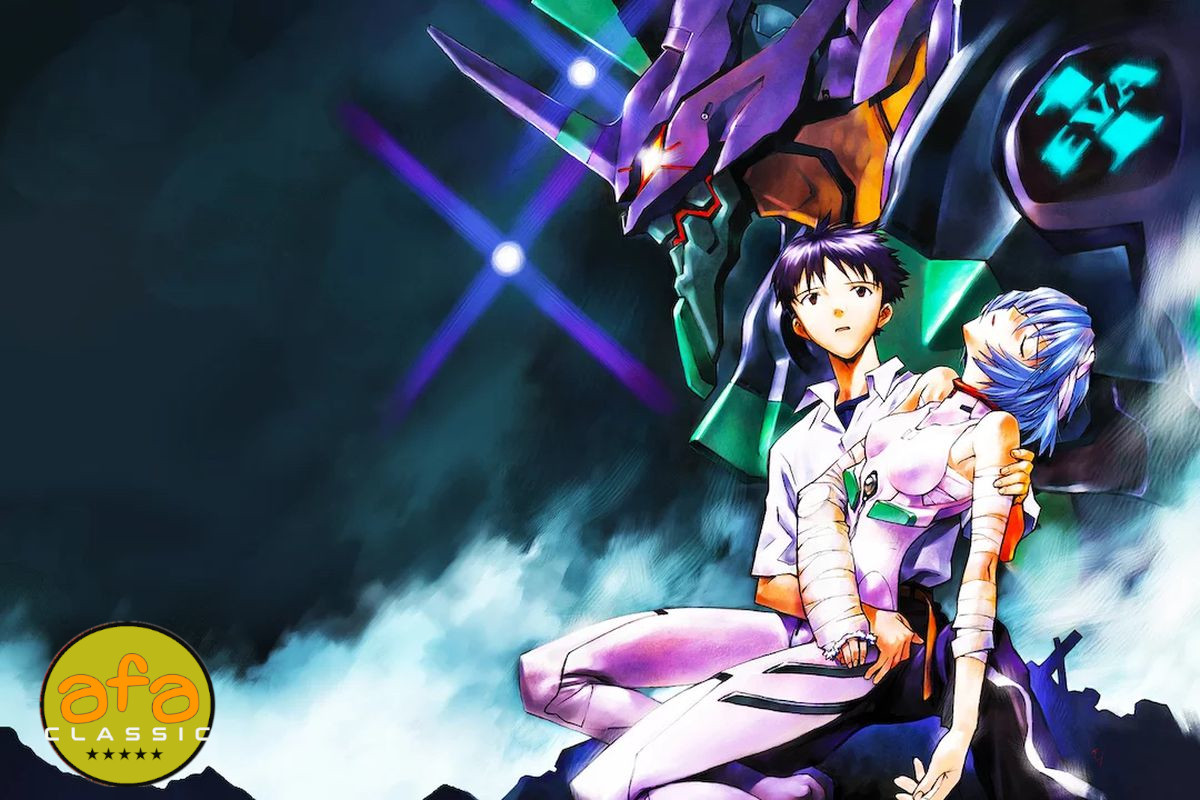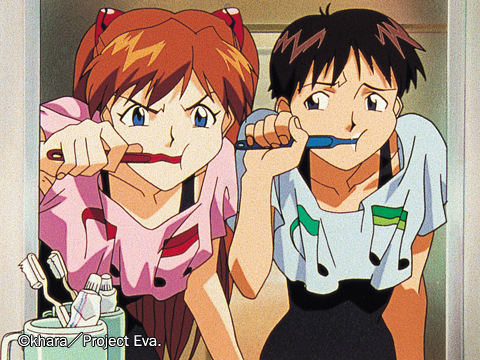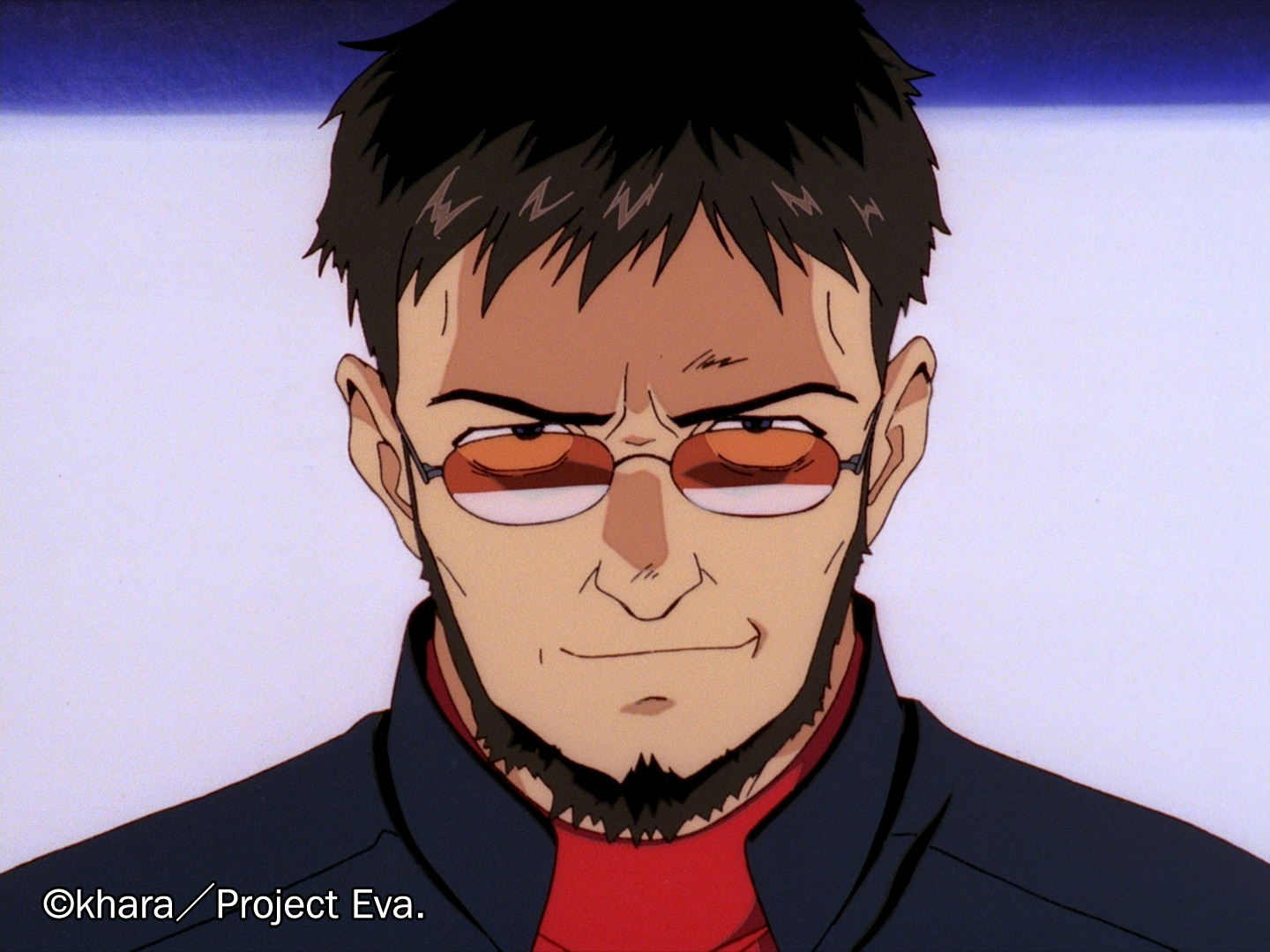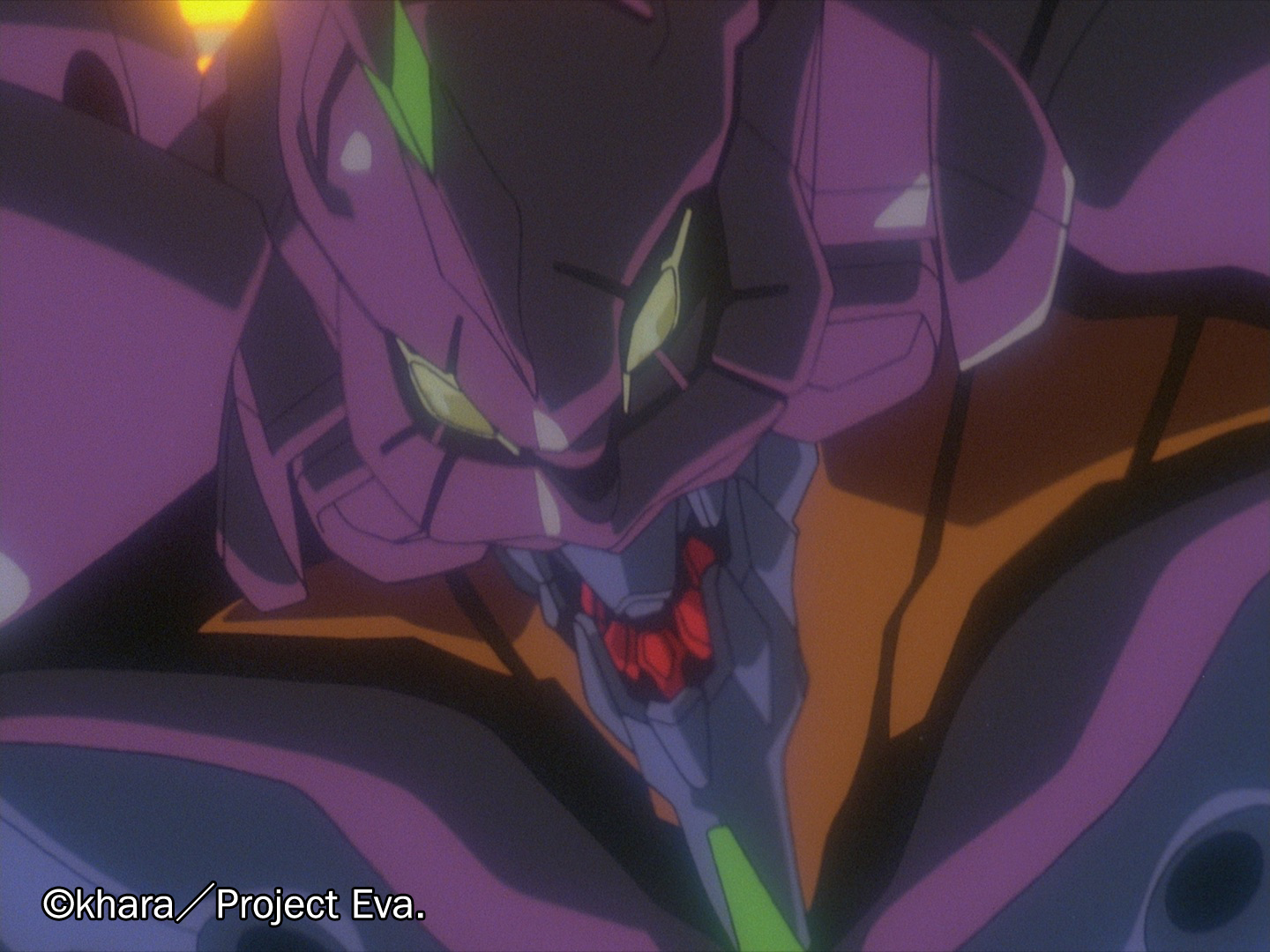Neon Genesis Evangelion (1995-96)
Neon Genesis Evangelion originally aired between October 1995 and March 1996 on TV Tokyo. It was produced by fan favourite studio Gainax (Gurren Lagann, Panty & Stocking) with animation production by Tatsunoko. It was created and directed by Hideaki Anno, who also wrote or co-wrote the script for every episode. Anno later established new studio Khara Inc to produce the Rebuild Of Evangelion reboot movies, and subsequently acquired the rights to the franchise.
Set 15 years after a catastrophic event called The Second Impact wiped out half of all human life, strange life-forms of unknown origin called Angels have started attacking the Earth. But this time humanity is prepared, and top-secret international agency NERV has developed humanoid weapons called Evangelions (often shortened to Evas) to defeat the Angels. Only those born post-Impact can pilot the Evas, and the shy, introverted Shinji Ikari- the 14-year-old son of NERV commander Gendo Ikari- is called up to be a pilot.
To anyone coming fresh to the series in the year 2021, it may not be immediately apparent just why the series is considered as significant and influential as it is. The plot doesn't sound like anything much different from dozens of other similar sci-fi anime. Which is actually kind of the point. Gainax was the first anime studio founded by hardcore anime fans ( or Otaku) and was in part a tribute to their favourite shows. It's essentially a "mecha versus kaiju" anime, the kind of series that inspired Guillermo Del Toro to create Pacific Rim twenty years later (Eva itself would also be stated as a major influence). Evangelion went on to inspire countless imitators, but giant robot anime has somewhat fallen out of favour more recently (the Gundam franchise aside) so newer fans may be less familiar with the genre.
Even if starts off a just another mecha anime, it certainly does not stay that way.In Anno's hands, it became a deconstruction of the genre. It took staples of the genre and asked how they might play out in reality. For example, the series took the common trope that only teens were capable of piloting the robots. Shinji is the opposite of many mecha-series heroes who are able to step into a cockpit and pilot as if they were an instant expert. Rather than a gung-ho character, Shinji is reluctant to pilot the Eva, and is essentially pressured into it by adults around him. Evangelion realises this is a pretty messed up idea. It questions the morality of adults strapping terrified children to untested bio-weapons and sending them to war and putting their lives on the line.
Although the Eva units are referred to frequently - both in the show and outside
of it- as giant 'robots' technically they are nothing of the sort. They are in
fact biological weapons, developed from the remnants of the Angels left behind
from Second Impact. These living creatures are contained with mechanical
frames, making them a sort of bio-mechanical hybrid. This leads to one of
the most dramatic and chilling scenes in the whole series when one of the
pilots loses control of the Eva as it goes into full-on berserker mode, its pilot only able to look on in horror. There's something extra creepy about robots that can bleed. The reality of just what the Evas are is gradually revealed as the series goes on.
Over the years Shinji has copped a lot of stick from fans, even earning the nickname 'whingey'. But the reality is that his reaction is in fact perfectly understandable and rational. He's not your typical anime action hero but his internal battle over the urge to run away from anything that scares him is as dramatically engaging as any action sequence. It's what makes Evangelion what it is. Anno has stated that the series plot was based largely around his own struggle with depression, and it's not hard to see Shinji as representing this in particular. Beneath the story of trying to defeat alien invaders and save the world, there is Shinji's journey towards self-acceptance and learning to love himself. This is obviously a very personal story for Anno.
One other element that separates the series is in its use of Judao-Christian imagery and terminology. It goes far beyond the enemies being called Angels, and includes lots of biblical allusions- even explosions often take the form of a cross. There's a debate whether there is any deeper meaning to be read into this or not. Some argue that it's mere window dressing, and it is just being used because the Japanese often view western culture as exotic and cool. The jury is still out on that one, but there are multiple potential readings of it.
Although it has never been expressly suggested on screen, one obvious potential reading of the plot is the idea that the Angels have literally been sent by God to destroy or punish humanity. For Japanese storytellers, there is a deep cultural connection to the idea of what its like being on the 'wrong' side of a conflict. This could be seen as an explicit criticism of Japan's World War 2 past and colonialist expansion. One pretty significant thing that supports this interpretation is the fact that Anno had previously explored a similar idea (without the religious allusions) in his earlier OAV series Gunbuster. Japan also has as part of its shared consciousness their unenviable role as the only country on Earth to have been attacked with atomic bombs- there are certain parts of this that play on that- most obviously in the event of Second Impact.
It shares that inspiration with Godzilla, Ultraman and other Kaiju films, which were also major influences on Anno. This can be seen most obviously in the designs of the Angels, which are varied, bizarre and distinctive, and also draw on biblical descriptions.
If all of this should make the series sound like it is an overly serious, sombre experience. then that's not the case at all. The series is full of exciting action sequences as the Evas fight off Angel attacks. They're a classic example of the War Room or bridge trope, where NERV staff bark commands to the pilots and watch the battles play out on giant screens. They're made all the more thrilling through the use of the outstanding drum-heavy battle theme that accompanies each of them, part of a generally excellent soundtrack.
Some situations Shinji finds himself in- like accidentally walking in on someone naked,
or falling onto someone- could come straight out of a romantic comedy or harem
anime. Gainax was at the time well known for their fan service, and there's
no shortage of that here.
The series is also part High-School anime, as Shinji has to cope with the usual trials of teen life when he's not saving the world. He attends alongside his fellow pilots, and he doesn't exactly have a smooth relationship with either of them, He doesn't really find it easy to connect with any of his classmates really, although he eventually does make a couple of good friends. The comedy usually comes out of the characters, who are a larger than life and memorable bunch.
Shinji is largely a passive character, but he's positively effervescent in comparison to the pilot of Eva Unit 0, Rei. Taciturn and enigmatic, Rei was the prototype mysterious girl, an archetype that became extremely common in anime that followed. Unit 2's pilot Asuka, is the absolute opposite, brash, confident and often obnoxious. The three of them trying to work together makes for some entertaining scenes.
Among the adult characters, Misato is a stand-out. The 27-year-old NERV Commander becomes Shinji (and later also Asuka's) guardian. Although she's very
competent at her job, outside of that her life is kind of a mess- living in an
untidy apartment and drinking too much. She's probably more relatable to
adult viewers than any of the teen cast. Her contrast between her outwardly acting like a responsible grown-up and her inward struggles make her an ideal
millennial icon. Misato was having trouble 'adulting' before that was even a thing.
Other than Misato, the most significant member of NERV is Shinji's father Gendo. His coldness to his son is there right from the start- it's no wonder Shinji's got Daddy Issues. Utterly ruthless and without any apparent emotion, he may be theoretically a "good guy" but he's definitely a bad dad.
It's probably the characters that have ensured that the Evangelion franchise is still so popular in Japan, rather than the plot. Typically appealing Gainax characters have made it still a series that remains in Japan's consciousness when a single season show from 25 years ago would typically be long forgotten.
Coming from the days before digital, the animation is decidedly old-school (although there was some limited CGI involved). It looks- and sounds- as good as it is ever likely to in the pristine HD Blu-Ray transfer and the original 4:3 aspect ratio is preserved. This will all be part of the appeal for fans who pine for the days of cel animation, but it may feel dated for newer fans.
Money-saving techniques are apparent throughout the series, for example covering characters' mouths when they are speaking. Which is often, as Evangelion has a lot of dialogue-heavy scenes. The series employs a frequent technique where characters are speaking in a location such as in a lift or on a train for an extended period of time with minimum animation. These can definitely be viewed as budget-saving scenes but interestingly enough they are retained in Anno's later Renewal Of Evangelion movie reboots, where budget was not an issue. This suggests these long sequences are actually a director trademark and not only there to keep costs down, even if they did start off that way. A masterful storyteller such as Anno is able to take these limitations and make an asset of them.
Still, these sorts of sequences do become more frequent as the series goes on. In its latter half Evangelion becomes a lot more unconventional and existential in its storytelling as it builds up to the finale. Audiences may have expected an action climax, but Anno gave them something very different- and altogether stranger.
To say that the concluding episodes were controversial would be putting it mildly. Audiences were divided on the angsty final two episodes which were either bold and experimental psychological storytelling or the result of Gainax running out of money and improvising, depending on who you ask (why not both?). The ending plays out mainly in the heads of its characters, with lots of reused footage, rough animation and even production materials used and with the ultimate fate of almost every character unresolved. It's not really such a big problem any more, seeing as even if you don't like it the more traditional ending comes in the film The End Of Evangelion. That film is included in all versions of the Blu-Ray release, or can be found streaming alongside the series on Netflix, alongside the recap film Death And Rebirth.
Long before those final episodes though, the series employs non-linear storytelling, with multiple timelines. Such techniques are now standard in western TV but at the time it was rare and innovative.
When you come to a hugely influential work many years later, after having first seen examples of works it influences, there is a danger that you won't appreciate it in the same way. Shorn of its context, Evangelion may not appear all that different from its countless imitators. Still, even if you choose to ignore possible subtext and all the surrounding conversation then Evangelion remains a very entertaining and consistently compelling sci-fi action show in its own right, with elements of fantasy and even horror.
Audiences in 2021 are not getting exactly the same experience as those who
watched it on TV, VHS or DVD way back when. When the series first dropped on
Netflix, it did so with a brand new English dub produced by VSI Los Angeles, dropping the original cast of
actors including Spike Spencer, Tiffany Grant and
Amanda Winn-Lee who played the characters across the original series,
the sequel movies and most even returned for the Rebuild films. Longtime
fans have come to associate the characters with those VAs so for them it's a
definite disappointment.
The new dub is perfectly fine for the most part but it uses a brand new Studio Khara approved translation, which is supposedly more "accurate" but has some strange word choices that always work in English (such as using 'children' as a singular label in place of 'child'). Fortunately, if you choose to pick up the Collector's or Ultimate Editions, the original ADV dub is included in full (plus the original dubs of the films) as an extra. Not included in any format (including via streaming) is the original closing theme music which was a cover of the crooner-classic Fly Me To The Moon sung by several of the original Japanese VAs. To be honest, you're not missing much, but it's a shame it's missing for nostaligia's sake if nothing else. Original opening theme Cruel Angel Thesis is fortunately present and correct in all releases (and remains a banger).
The Blu-Ray releases differ in content via editions, but even the standard release is packed with features running more than five hours, ranging from standard extras such as trailers, music videos, clean openings and closings, to new extras such as VA auditions and animatics. The pricier Collector's and Ultimate Editions also include some fancy physical extras such as art cards, exclusive books and (in the Ultimate edition) a limited edition paperweight of the Angel Satchiel.
This has been a long time coming, but it's a welcome chance to revisit a classic for those who saw it the first time, and a must have for anyone interested in the history of Japanese animation. For newbies, it's a chance to see just what the fuss is about.
★★★★★


































